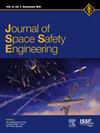长时间太空旅行中人类和人工智能的考虑——人的因素视角
IF 1
Q3 ENGINEERING, AEROSPACE
引用次数: 0
摘要
与地面支援的实时通信是确保宇航员在太空安全的基础。然而,随着太空任务离地球越来越远,通信将会有很长的延迟。在时间和生命危急的情况下,船员将需要机载人工智能(AI)驱动的技术来支持异常缓解决策和响应。本文讨论了人为因素的考虑,以帮助机组人员解决问题,减少错误,提高探索级任务的安全性。本文章由计算机程序翻译,如有差异,请以英文原文为准。
Human and artificial intelligence considerations for long duration space travel – A human factors perspective
Real-time communications with ground support are fundamental to ensuring crew safety in space. However, there will be long delays in communication as space missions travel further away from Earth. During a time- and life-critical situation, the crew will need on-board Artificial Intelligence (AI) driven technology to support anomaly mitigation decision-making and response. This paper discusses human factors considerations to help crew problem-solving, reduce errors, and enhance safety on exploration class missions.
求助全文
通过发布文献求助,成功后即可免费获取论文全文。
去求助
来源期刊

Journal of Space Safety Engineering
Engineering-Safety, Risk, Reliability and Quality
CiteScore
2.50
自引率
0.00%
发文量
80
 求助内容:
求助内容: 应助结果提醒方式:
应助结果提醒方式:


